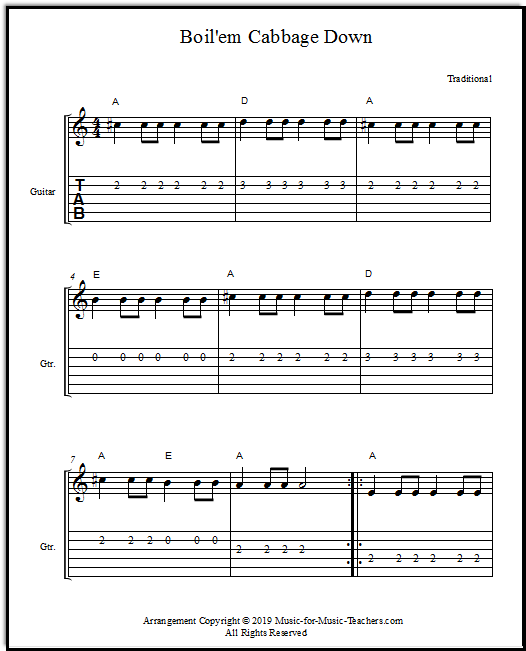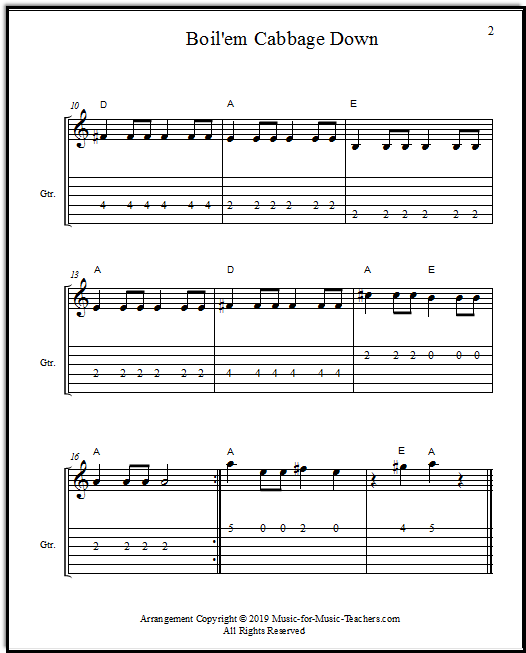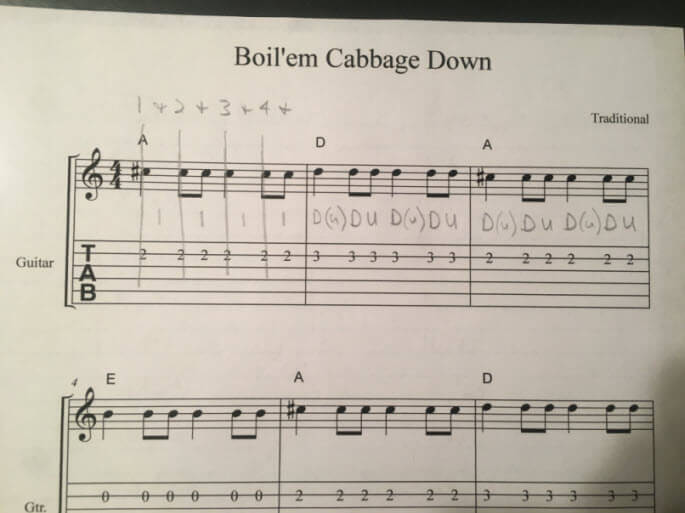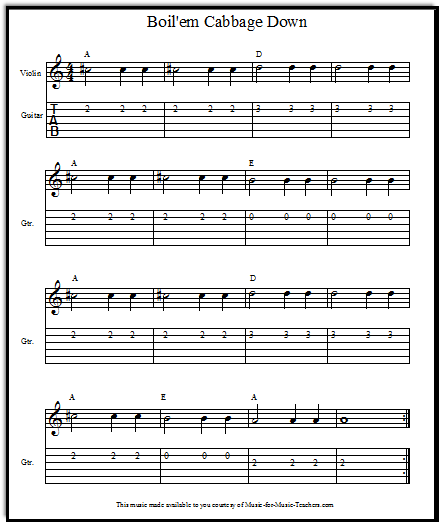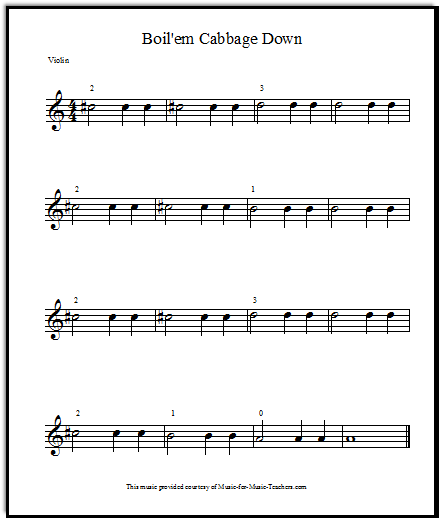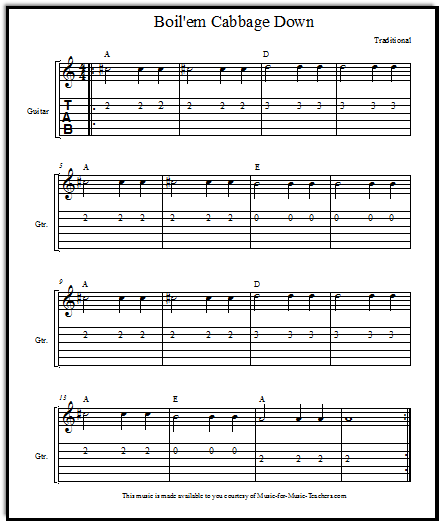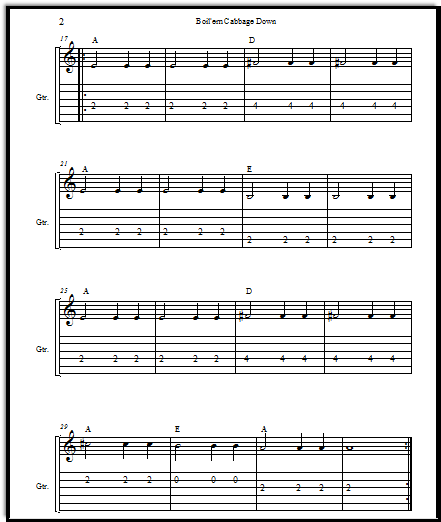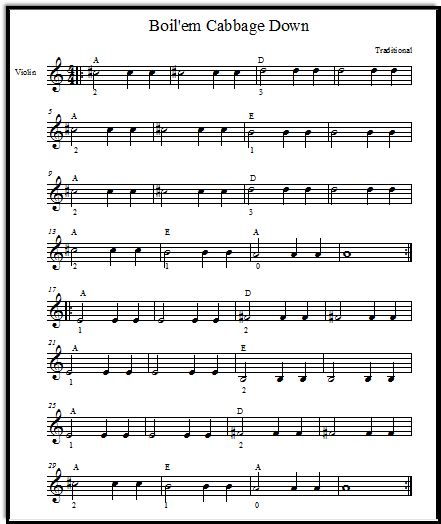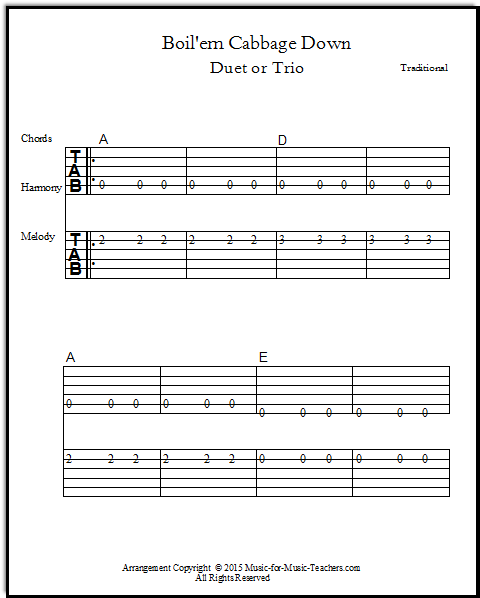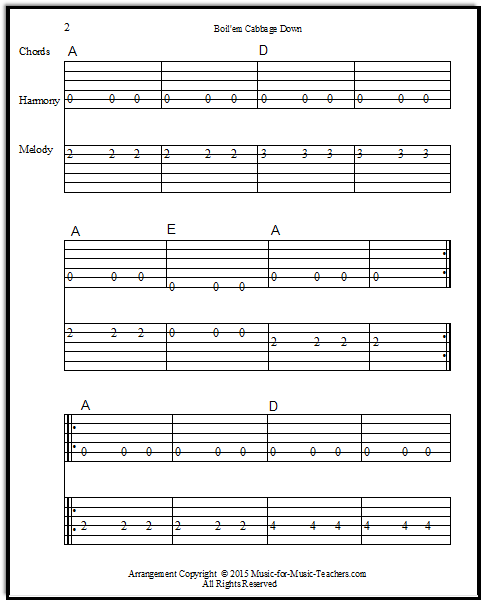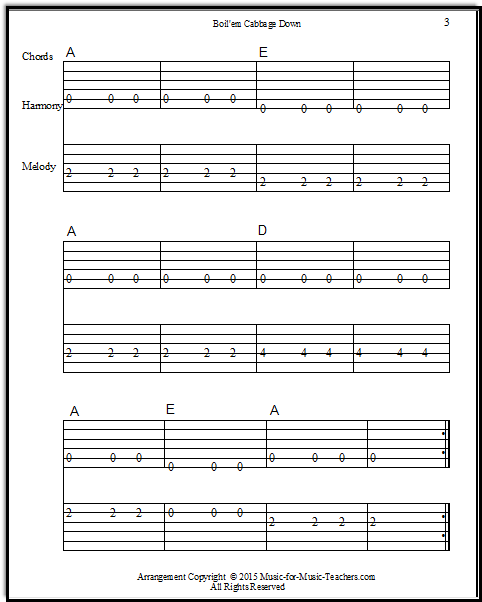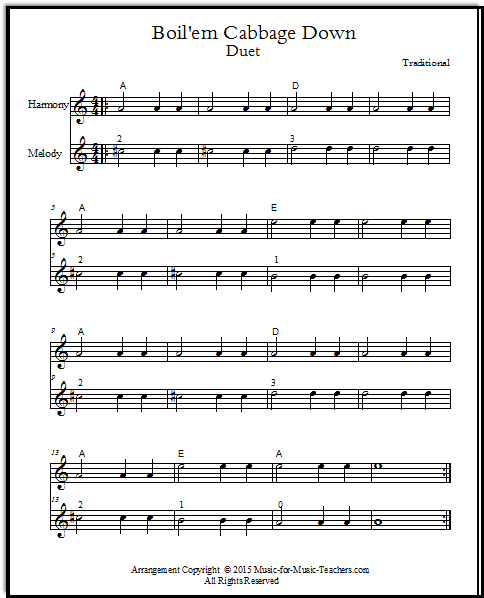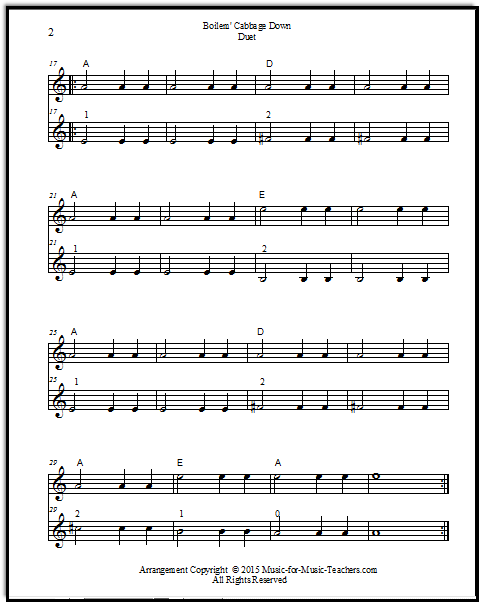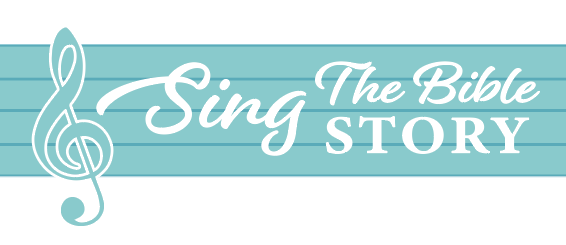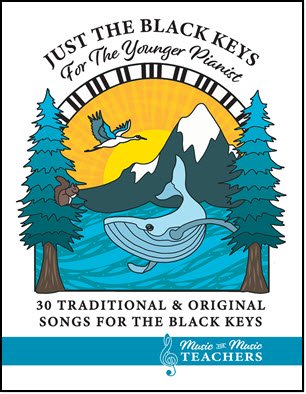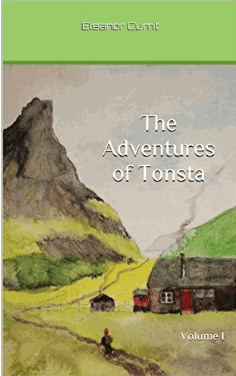Beginner Guitar Song & Fiddle Song Too! Boil'em Cabbage Down
Beginner guitar song Boil'em Cabbage Down - now with an eighth note arrangement, just like "grown-up" flat-picking music!
This is a great beginner technique song for both fiddle players and flat-picking guitar players.
On this page find:
- Seven solo versions (one or two pages) for guitar and fiddle
- A super-easy duet that uses open strings for the second guitar
- A duet for violins
Your beginner's first real flat-picking piece
Please scroll down the page for the download links.
Guitar tabs and standard notation
This is one of the easiest guitar songs around for flat-picking, and for the fiddle, Part A is all on one string.
Please scroll down the page for the links to the free PDFs.
Imagine a ruler to mark off counts
What I like to do when introducing my young flat-pickers to eighth notes is DRAW on the sheet as if each beat is a ruler marking.
Each new beat is an "inch"; each eighth note on the half beat is a "half inch." So far, this makes sense to my students, and they are able to draw in the "inch" and "half-inch" marks themselves, pretty quickly!
The "inch" marks coincide with the DOWN motion of the pick, and the following "half inch" marks are where the UP pick motion occurs.
In the example above, you can see where I've written D (for DOWN) and U (for UP). Some of the "U"s have parantheses around them; that's because they are "SILENT ups."
I tell my students that a DOWN must always come back UP again, even when it is silent. That's also how they learn to strum, so this makes sense to them.
A version that is easier to count
Below is an easy-to-count version of this song. It is what I use for starting beginners, when they are just learning to count note values.
For a few weeks, we'll stick with this until the notes are learned, and then switch to the eighth note version (above) to focus on DOWN, DOWN-UP with the flat pick.
Please scroll down the page for the download links.
Below is a FABULOUS rendition of Boil'em Cabbage Down, but the music starts just after 30 seconds in...
Part 1 is very easy for fiddle
One neat thing about the first part of Boil'em Cabbage Down on the fiddle is that the melody stays all on one string -- perfect for beginning fiddle players.
Even very young children, just learning their finger numbers, do well with this piece. The rhythm is all the same -- "blue-ber-ry, blue-ber-ry," is how we say it for my beginners. Or, "One-two, one, one, One-two, one, one," as we clap the half notes and quarter notes.
And for beginning guitar players, Boil'em Cabbage Down is a good first song to practice the Down, Down-Up movement of the pick. (With the chords, also, the Down, Down-Up pattern makes a nice strum.)
This sheet is only half the melody, but since it uses 2 strings and employs a tricky rhythm, that is quite enough for a young guitar player.
Look at the slow (in appearance) rhythm I have presented this song in (it really uses quarter and eighth notes, not the ponderous-appearing half and quarter notes).
Students will certainly want to stroke it all DOWN strokes (Down, Down-down), and at first that will be fine. But as they get able to play it faster and faster, you will want them to flat-pick it with a Down, Down-UP stroke.
For beginning fiddle
Please scroll down the page for the download links.
For beginning fiddlers, I like this simple sheet with only half the melody.
It is clean, with no distractions, not even chord symbols. To be able to get all the way to the end of the page seems like a real accomplishment, and even that may be too much for a very young beginner.
Save the full piece (see below) until after they can do part 1 smoothly.
Best song for learning the A chord family
Boil'em Cabbage Down is also my favorite way to have guitarists learn the A - D - E chords.
But I recently taught it a new way to a beginner... instead of STARTING with A then going to D & E, I started with Em, a chord (the only chord) he knows well.
Then, keeping the Em chord (fingered with 1 & 2), we changed fingers to 2 & 3, & added the index (finger 1) in fret 1 of the G string to change the chord to major.
From THERE we slid down with “anchor finger” 1 (index finger) to the A chord. Fingers 2 & 3 surrounded the 1 finger, on the adjacent strings.
Back & forth we played the chords. Finally, we added the D chord. Soon he had it almost memorized, as we played Boil'em Cabbage with a DOWN, DOWN-UP rhythm.
Then finally I had him try without looking at the strings. That is also his goal for his next guitar lesson, to be able to play and change these chords with closed eyes.
The full melody of Boil'em Cabbage Down
Please scroll down the page for the download links.
Full melody for fiddle on one page
Please scroll down the page for the download links.
A super-simple duet part for guitar
Though it is all open strings, it may still be confusing to your young student.
Please scroll down the page for the download links.
I've put the Harmony part on top, instead of on the bottom where it is usually found, so that beginners won't have to search so hard!
So what's the POINT of this "easy-peasy" ensemble arrangement?
Mostly just to get them playing something that sounds like music, while working on their flat-picking.
And also, helping them feel a rhythm and hear simple harmony without being distracted and thrown off their part (a common occurrence in duets with beginning piano players).
Turn the duet into a trio
This duet can be considered a Trio if a third guitarist strums the chords (but they'd better not strum too loudly and drown out the flat-pickers!).
How in the WORLD can we know what the rhythm is, with these guitar tabs? Answer... we can't!
Tell them about standard notation
And this is an excellent opportunity to stress to your young guitarists the importance of learning how to read standard notation. They want to be independent musicians, right? Or do they want to have someone always holding their hand?
Of course, you can pencil in a few notes in between or below the staves... quarter, eighth-eighth, quarter, eighth-eighth, etc. That's what I do.
But the rhythm... well, you'll have to teach them by rote. You might do what I'm doing with this duet: writing "D DU D DU" etc., indicating "Down, down-up, Down, down-up" in each measure.
A fiddle duet, with open strings for harmony
Here is the new violin (or fiddle) duet, also with an easy open-strings only harmony.
Will it be what your beginners WISH to play? NO - they'll really want to play the MELODY. But here is where they can practice their bow strokes while making music, without having to worry about their left hand.
Please scroll down the page for the download links.
All right, I'll admit that measures 23 and 24 are a bit startling, with the sudden divergence between melody and harmony.
Melody dives to the low G string, while the harmony leaps up to high E! OH WELL - this song is very much about keeping the shuffle rhythm going, and making an easy duet together. I haven't heard any complaints yet from my violin students.
No key signature. Right. Those are a very confusing item for beginners - I don't really go there for a while.
You will have to introduce your young fiddlers to the concept of chord symbols - they are very likely to presume the "A", "D", and "E" letters over the staff are the note names, especially as they often do happen to coincide, especially in this little duet.
This is just one version of this beginner guitar song
As is common with traditional or folk sheet music, you can find many variations of the melody and words.
The version I have here is like the one used by Brian Wicklund in his book Mel Bay American Fiddle Method, Vol. 1 (Book & CD). It is the first song in his very fine and useful book, which I use with my fiddle students.
However, instead of waiting until violinists can read and count these rhythms, I start the young ones out reading this song with half notes and quarter notes, so they can count it.
Most young fiddle and guitar players don't really understand eighth notes... they just feel them and learn rhythms by ear (listening over and over).
Playing by ear is necessary, but not enough to make a truly independent musician.
Think of the sheet music/tabs as a map
For my non-readers learning how to play fiddle, they can use the music like a map, as long as they know their alphabet and numbers.
I have them choose different colored felt pens to circle or loop around note groups -- all the notes on the A string, for example, might have a pink circle around them, or a pink loop enclosing them all, or a pink line linking them together.
The student chooses which color pen goes with which "string".
Recently, one of my young students (perhaps fearing I was about to make a mess out of his music with blue, green, and pink pens) suggested tiny dots of color beneath each note, instead of big loops. Very dainty. And fast!
The lyrics of Boil'em Cabbage Down
The words of this melody do not match the rhythm most commonly used by instrumentalists in Boil'em Cabbage Down! You'll catch on to this if you listen to groups perform it.
Basically, the words go like this:
Went up on the mountain
To give my horn a blow
Thought I heard my true love say
Yonder stands my beau.
Racoon and a possum
Running side by side
Racoon says to the possum
Won't you be my bride.
Boil'em cabbage down, boys,
Turn the hoecake brown
The only song that I can sing is
Boil'em cabbage down!
Brian Wicklund has more words in his book, Mel Bay American Fiddle Method, Vol. 1 (Book & CD).
There is so much you can teach beginning fiddlers and guitar players with this simple but fun piece!
The more you work with it, the more uses you find for it as a teacher. It is a terrific, high-energy song for groups, but is excellent for brand-new beginners to wrestle with on their own.
When they learn to play it up to speed, it will be FUN too!
The links for the guitar solos:
Download beginner guitar song Boil'em Cabbage with eighth notes
Download guitar and fiddle tabs for Boil'em Cabbage Down with quarter notes, one page
Full melody for guitar free sheet music for Boil'em Cabbage Down, with quarter notes
The links for the violin solos:
Violin only sheet music for Boil'em Cabbage Down, one page, with quarter notes
The guitar duet link:
Download easy open-string harmony duet for guitar
The easy violin duet link:
Download violin duet for beginners, Boilem' Cabbage Down
Dianna:
Your website is a light in the darkness. THANK YOU for all you do in helping to spread the love of music. It matters!
Recent Articles
-
Unchained Melody Piano Sheet Music, Chords & Lyrics
Unchained Melody: an intermediate-level arrangement that captures the beauty & power of this song, in a version suited to piano. What do I mean? No triplets! -
Thank you so much for the rounds!
Hi Dana, I am just writing to thank you for the free rounds for singing -- I have put up my hand to lead folk songs and hymns for my Christian homeschool -
Teacher
I stumbled upon this site by accident, and am very glad I did. As a bumbling untrained music teacher, I like your hints about how to teach - although I -
Auld Lang Syne Sheet Music PDFs: for All Instruments & Singers!
Auld Lang Syne sheet music for New Year's Eve & other gatherings! Piano arrangements, guitar tabs, & lead sheets with chords in many keys, for all singers. -
Favorite Christmas Songs: Duet Vocal Sheet Music
The best duet Christmas songs are those ones you knew & loved as a child! This set of 14 "a capella" carols arranged for 2 voices is just right for caroling!
Interested in songs from the Bible for your students or church? Check out my other website, SingTheBibleStory.com!
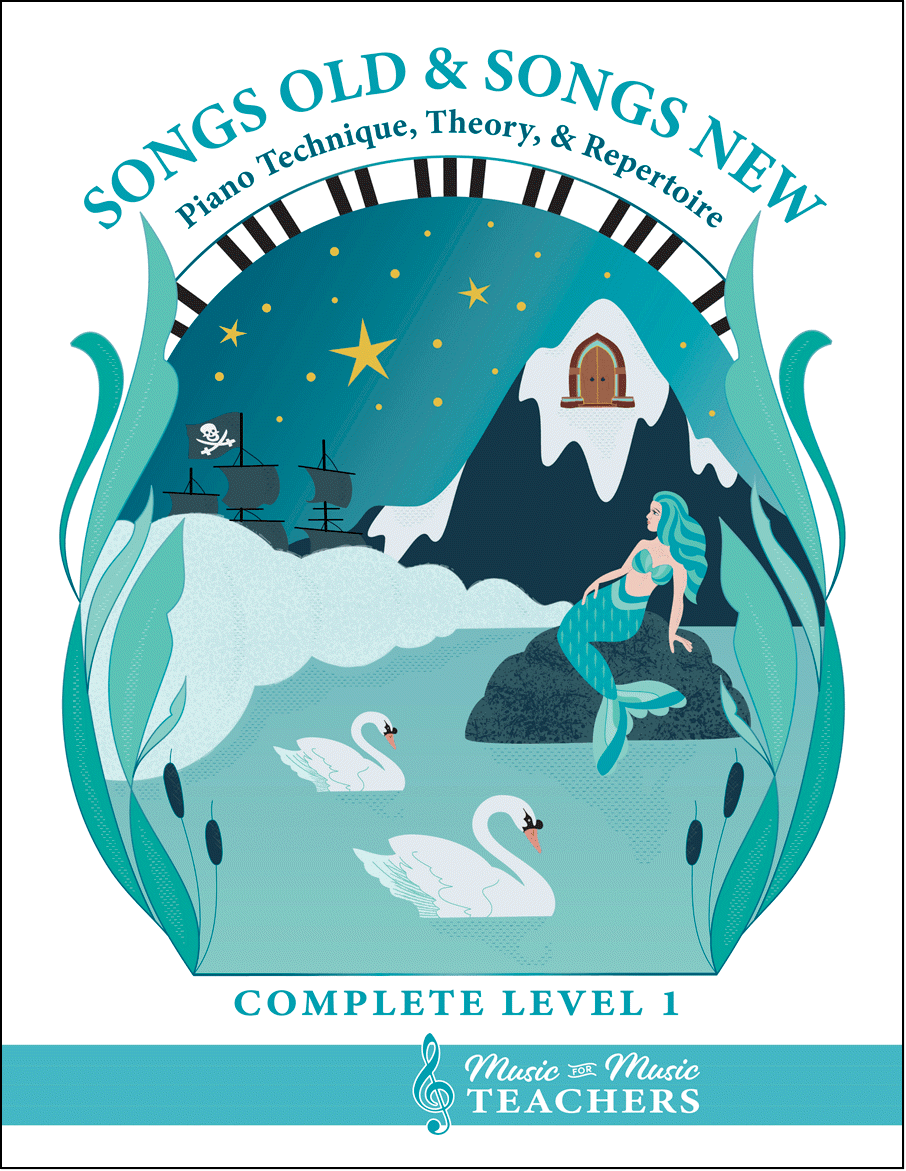
All the first-year material I give my beginner students.
Piano keyboard sheets, scales, chords, note-reading exercises, and over 256 pages of music!
Music-for-Music-Teachers.com is a participant in the Amazon Services LLC Associates Program. As an Amazon Associate I earn from qualifying purchases.
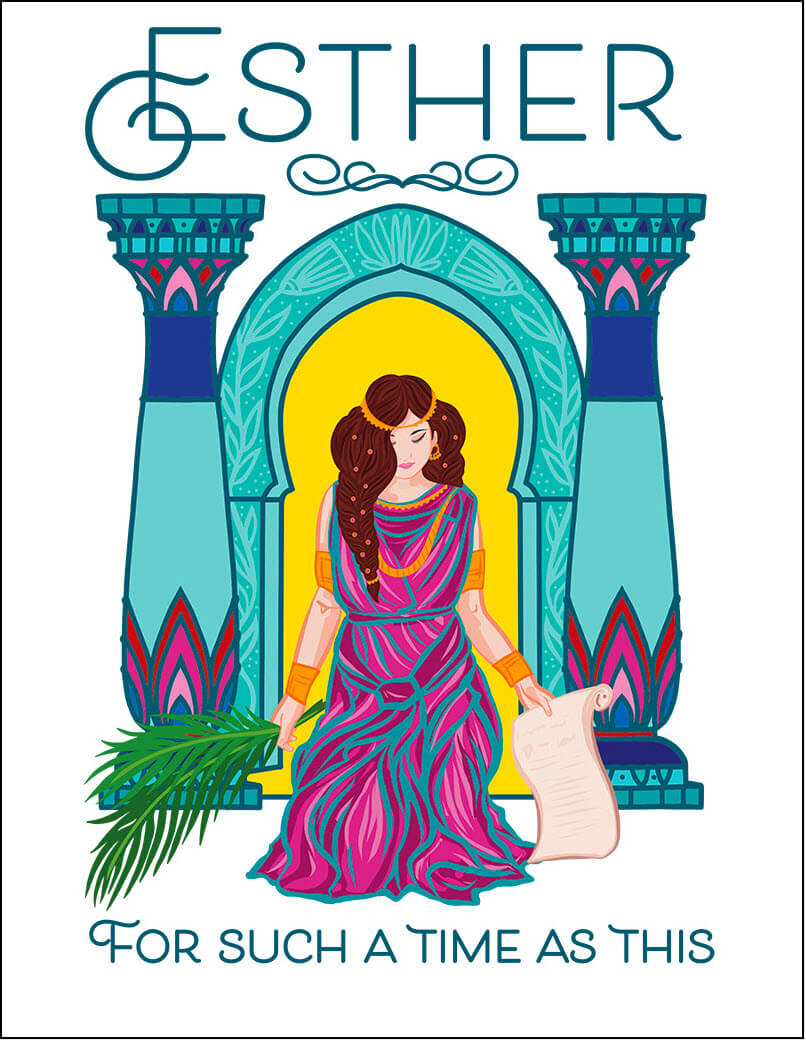
This beautiful song book for piano & voice "Esther, For Such a Time as This", available as a digital download, tells the riveting story of the time when Jews in ancient Persia faced a foe named Haman, and how a brave young queen risked her life to save her people.
A good choice for a singing story-teller, an operatic group, a short theater production, or a class of children!
This book is also available from Amazon as a paperback.
Music-for-Music-Teachers.com is a participant in the Amazon Services LLC Associates Program. As an Amazon Associate I earn from qualifying purchases.
This book is available as a digital download from this site. Visit this page to see some free examples from the book.
It is also available from Amazon as a paperback!
This is the perfect easy start for little pianists.
And when they start reading white-key notes on the staff, this is a fun easy resource to say each week, "Choose a new black-key song at home this week and figure it out to show me next lesson!" They will be spending more time at the piano.
Music-for-Music-Teachers.com is a participant in the Amazon Services LLC Associates Program. As an Amazon Associate I earn from qualifying purchases.
A perfect read aloud storybook
for little boys or girls.
The Adventures of Tonsta highlight the travels of a very young boy with a good heart, who goes about helping folk in trouble.
With a red cap on his head and a sack of tools slung over his shoulder, Tonsta seems to meet people in distress wherever he goes.
Lots of trolls in this book - including one who gives him a Christmas gift!
Music-for-Music-Teachers.com is a participant in the Amazon Services LLC Associates Program. As an Amazon Associate I earn from qualifying purchases.
Comments
Do you have a story or a question about teaching guitar? Do you think it is a hard instrument for beginners, or easy? What have been your challenges?
Please note that all comments are moderated, and will not appear until I have approved them. Also, IF YOU ARE ASKING FOR MUSIC THAT IS NOT IN THE PUBLIC DOMAIN, YOUR REQUEST WILL BE IGNORED. That's pretty much any music written in the last 75 years...
About the Author

Hi, I'm Dana! (Say that like "Anna".) I'm the owner of Music-for-Music-Teachers.com, and a newer site, SingTheBibleStory.com.
Like some of you, I've been playing the piano since early childhood, and have added a few other instruments along the way, plus an interest in arranging and composing music.
You can find out more about me and the reason for this website at my About Me page.
